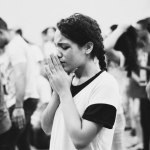Loving Our Neighbors in an Election Year
Dear friends,
The well-known parable about the Good Samaritan is Jesus’s response to an expert in the Law who asks Jesus how he might be saved. Jesus asks him about what is written in the Law. The man answers, “‘Love the Lord your God with all your heart and with all your soul and with all your strength and with all your mind and, ‘Love your neighbor as yourself.”
“You have answered correctly,” Jesus replied. “Do this and you will live.”
But he wanted to justify himself, so he asked Jesus, “And who is my neighbor?”
What follows is Jesus’s telling of the scandalous parable of the Good Samaritan. The boundaries of neighbor get pushed beyond just polite sensibilities.
This past weekend, World Relief Upstate hosted an event called, Love Your Neighbor, in Greer, South Carolina. World Relief Senior Advocacy Specialist, Austin Donahoo, who organized and spearheaded the event, said: “In helping to coordinate advocacy efforts for World Relief in South Carolina, I quickly realized that the negative response to immigration was evidence of a much deeper issue. There was an overall forgetfulness as to what the Bible says about loving neighbors well, especially those neighbors on the margins. I wanted to put together an event that reminded the Christian community of our call to be an example of Jesus in proclaiming restoration and reconciliation. This is emphasized not only with personal transformation but the flourishing of whole communities, both local and global.”
Christians came and took copious notes as four speakers addressed a myriad of ways Jesus calls us to love our neighbor in these challenging times. It was deeply rooted in Scripture, hope, the good news of the Gospel, and practical wisdom.
Author, doctoral student, and co-host of the Holy Post Podcast Kaitlyn Schiess set the tone with spiritual formation and love of neighbor. She said: “Our political life is so much bigger than one vote every four years. But when we think about political engagement, we don’t often consider what kind of people we need to be to do this well.”
She grounded the audience in Scripture as well as practical steps for how we do spiritual formation well including being deeply rooted in a local church.
Lanre Williams-Ayedun, World Relief Senior V.P. of International Programs, spoke of loving your neighbor across the globe (with a humbling statistic that 80% of our neighbors are not in North America or Europe), how global Christians are loving neighbors well and how we can learn from them. “Love compels us not to turn a blind eye to the suffering of our global neighbors.”
As many turn inward in public conversations, this is a challenge that Jesus’s call to us is to lean in and see the suffering of the world even as there are those who want us to only focus on ourselves.
I had the privilege of speaking there as well, as a mobilizer for the National Immigration Forum. I spoke of loving our immigrant neighbors and reminded people of the quartet of the vulnerable and God’s particular care for the widow, poor, foreigner and orphan. I asked people to ground their theology in the sovereignty of God and the hope of the gospel. 108 million people are displaced globally, and the Church has a call to respond. There are many practical ways to engage in ministry with new immigrant neighbors as well as to learn from the immigrant churches God is sending to us.
Director of Government Affairs for World Relief Chelsea Sobolik guided the audience to love their neighbor across political difference. In times of fragmenting and deep political polarization, rooting our identity in the gospel and not political parties gives us a different way to live as believers.
“From Genesis to Revelation, we have the people of God oriented outward, seeking the flourishing of the world around them.” Kaitlyn reminded us. We all left with hopeful hearts and posture that this is how we want to be the Church in the world and to love our neighbors well whether they are the new Afghan, the asylum seeker at the border, our neighbors in a rural village across the world, or those we differ with politically. Join me in praying that we as individuals, our churches and communities can accept the call to be loving neighbors, pushing the boundaries of our own circles and comfort and loving beyond fear and difference.
As we walk through this contentious election season, would you join me in praying that the witness of the church in the United States would reflect our love for our neighbors?
In Christ,
Christy Staats
Regional BBB Mobilizer, National Immigration Forum





